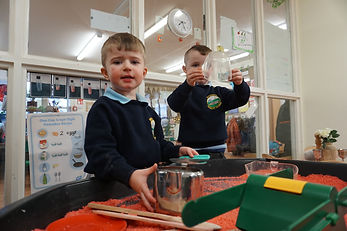Starting School
School Day
Useful Info
Community

Parental Involvement
At Burnhope Primary we welcome feedback from parents and encourage you to contact school if you have any enquiries. Our office staff Miss Haddow is available from 8am-4pm. If you require a meeting with a member of staff please call into school to make an appointment.
We also use an app called ‘Weduc - Reach More Parents’ which has a private messaging system so parents can contact the school office or Headteacher. From this app staff can share photos of work children have completed, keep parents up to date with school events and celebrate success. It is a useful way to keep in touch and find out what is happening in the classroom.
Each teacher also keeps records of every child’s progress. All parents are invited to attend parent meetings throughout the year.
Written annual reports are provided for all pupils, usually in July. There are many events throughout the year which parents are invited to. These include; Harvest Festival, Christmas Play or Nativity Plays and Coffee Mornings.
There are a number of things you can do to support your child at home to make their school life easier. Please do not hesitate to contact us if you need any advice or support.
Video – Parental Involvement
Homework
There are a number of ways you can support your child…
-
Keep stationery for homework in a special place – pencil, rubber, ruler, coloured pencils or crayons.
-
Make sure children have a quiet place to do their homework – with no distractions.
-
Check your child has completed their homework neatly and to the best of their ability.
-
If your child is too tired, please leave their homework until they are more alert and refreshed.
If you have any questions about homework please feel free to contact us.
Reading
“Reading aloud with children is known to be the single most important activity for building the knowledge and skills they will eventually require for learning to read.” — Marilyn Jager Adams
At Burnhope Primary School we aim to develop skills and knowledge and understanding in our pupils which will enable them to:
-
read and write with fluency and understanding.
-
use a full range of reading cues (phonic, graphic, syntactic, contextual) in order to monitor their reading and correct their own mistakes.
-
understand the sound and spelling system and use this to read and spell accurately.
-
have fluent and legible handwriting
-
have an interest in words and their meanings and acquire a growing vocabulary
-
know, understand and write in a range of genres in fiction and poetry and understand and be familiar with some of the ways in which narratives are structured through basic literacy ideas of setting, character and plot
-
understand, use and be able to write a range of non-fiction texts
-
plan, draft, revise and edit their own writing
-
be interested in books, read with enjoyment and evaluate and justify their preferences
-
use reading and writing in order to increase their powers of imagination, inventiveness and critical awareness.
Pre-Reading Skills
Pre-reading skills are the skills children need in order to help them to become a reader. Many of these skills are learnt naturally, during the course of a normal childhood, at home and in the nursery/preschool environment.
By talking and reading with your child, you will be doing a great deal to help these essential skills to develop.
-
Matching: When we read, part of what we do involves matching. Children learn to match shapes, patterns, letters and, finally, words.
-
Rhyming: Research shows that children who can understand about rhyming words have a head start in learning to read and, even more, to spell.
-
Letter skills: As well as recognising letter shapes, learning the most common sounds that each letter makes will give children a head start.
-
Direction: Print goes from left to right, so children will need to be familiar with where to start each line and which direction to go in.
-
Motor skills: Practicing writing letters and words as they learn to read them will help it all to sink in, so a good pencil grip and control is useful.
-
Concepts of print: This is all about knowing how to handle books – holding them the right way up, turning the pages in sequence, exploring the pictures, knowing that the words can be read to tell a story.
-
Language skills: The more experience children have of language, the more easily they will learn to read. Your child needs to hear and join in conversations (with adults and children), and listen to stories and poetry of all sorts.
The more that you read, the more things you will know. The more you learn, the more places you’ll go!



